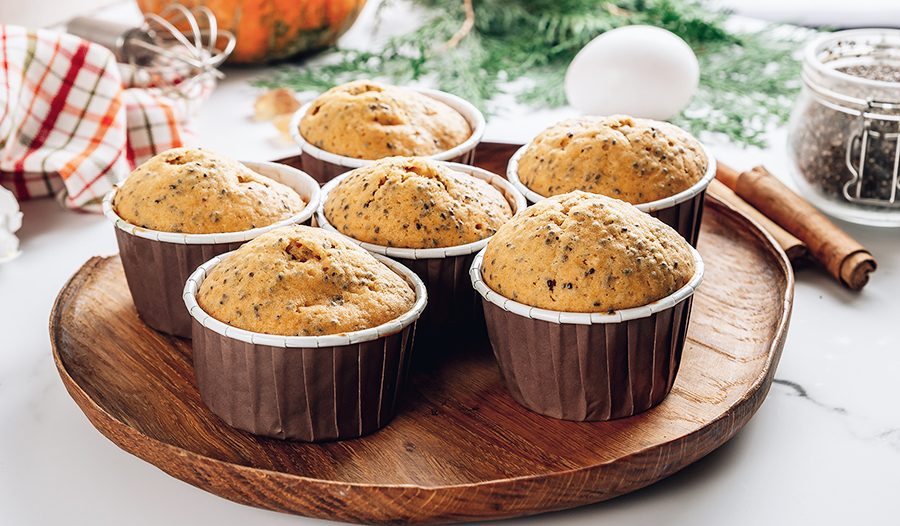7 måder at erstatte æg i madlavning og bagning

Når det kommer til bagværk, er æg typisk en basisingrediens, der er nødvendig. Men lad os sige, at du ikke spiser æg, har en ægallergi, eller at du har glemt at købe dem i butikken. Hvad laver du!?
Der er mange grunde til, at du måske søger at erstatte æg. Æggeallergi er en af de otte mest almindelige fødevareallergier. De fleste børn, der er allergiske over for æg, kan muligvis tåle æg over tid, men nogle vil forblive allergiske hele deres liv. Nogle mennesker undgår æg på grund af kostpræferencer såsom veganisme - når man vælger at afholde sig fra animalske produkter, inklusive æg. Hvis du vælger ikke at bruge æg af en eller anden grund, er du heldig! Der er mange ingredienser, du kan bruge i stedet for æg i bagning.
Æggens rolle i bagning
Ved bagning bruges æg til mange forskellige formål. De har indflydelse på bagværks struktur, farve, smag og konsistens ved at tilføje følgende kemiske reaktioner.
- Fugt: Den flydende del af æg absorberes i de øvrige ingredienser, der tilfører fugt til det færdige produkt. Ved ægerstatning kan denne fugt komme fra en kilde som vand.
- Binding: Æg hjælper med at holde ingredienserne sammen på grund af deres struktur, hvilket forhindrer bagværk i at falde fra hinanden. I ægerstatninger kan binding komme fra mange forskellige kilder, som du vil se nedenfor i eksemplerne.
- Hævning: Æg fanger luftlommer i fødevarer, hvilket får dem til at ekspandere under opvarmning. Dette giver bagværk deres volumen såvel som en let, luftig tekstur. Dette kan ses, når du bruger en ægerstatning som aquafaba.
- Udseende: Æg brune, når de udsættes for varme, hvilket giver bagværk en brun farve.
7 måder at erstatte æg i bagning
Disse eksempler er gode til udskiftning af et æg. For de bedste resultater skal du erstatte fire eller færre æg; mere end det kan forårsage en uønsket smag eller tekstur.
Hvordan man laver et høræg
Høræg er en af de mest populære muligheder, når du udskifter æg i bagning. Hørfrø er en fantastisk kilde til omega-3 fedtsyrer og protein.
For at erstatte et æg med et høræg, bland 1 spsk malet hørfrø sammen med 2 1/2 spsk vand og lad sidde i cirka 5 minutter. Du kan købe malede hørfrø eller male dem selv ved hjælp af hele hørfrø. Denne udskiftning kan gøre bagværk tungt og tæt. Det fungerer bedst i pandekager, vafler, muffins, brød og småkager.
Hvordan man laver et chiaæg
Chiaæg er ikke helt så populære som et høræg, men fungerer næsten på samme måde med en meget lignende næringsfordel. Sammenlignet med hørfrø indeholder chia mere magnesium, fosforog selen pr. Portion. For at erstatte et æg med et chiaæg, bland 1 spsk chiafrø sammen med 2 1/2 spsk vand og lad sidde i cirka 5 minutter. Denne udskiftning kan også gøre bagværk tungt og tæt. Ligesom høræg fungerer det bedst i pandekager, vafler, muffins, brød og småkager.
Erstatning af bananæg
Bananer som ægerstatning er gode, hvis du kan lide smagen. Brug af denne udskiftning giver det færdige produkt en let banansmag. Bananer er også en god kilde til kalium, vitamin B6og vitamin C. Andre purerede frugter som græskar og avocado fungerer lige så godt med mindre smagsændring. Et æg svarer til 1⁄2 medium moset banan. Dette fungerer bedst med kager, muffins, brownies og hurtigt brød.
Erstatning af æblemos
Vidste du, at æbler er en af de højeste frugtkilder til antioxidanter ? Det samme gælder æblemos. At vælge en usødet sort er det bedste til bagning. Hvis du vælger aromatiseret æblemos, kan det have tilsat sukker. Hvis det har tilsat sukker, skal du justere mængden af sukker, du tilføjer som ingrediens. For at erstatte et æg med æblemos svarer 1⁄4 kop æblemos til et æg.
Erstatning af silketofu-æg
Tofu er en god mulighed, fordi den har en neutral smag og er høj i protein. Der er mange forskellige typer tofu. Silketofu er bedst til bagning, da den har højere vandindhold. Jo mere vand der presses ud, jo mere fast bliver tofuen. For at bruge som ægerstatning i bagning svarer et æg til 1⁄4 kop silketofu. Dette bruges bedst i brownies, småkager, hurtigbrød og kager.
Aquafaba-ægudskiftning
Dette er den væske, der er tilbage fra tilberedning af bønner eller bælgfrugter— den samme væske, som du hælder ud af en dåse kikærter. Aquafaba er en god erstatning for æggehvide, da den har en meget lignende konsistens. Den eneste ulempe ved at bruge aquafaba som ægerstatning er forberedelsesarbejdet. Disse kræver lidt piskning, indtil de er hvide og skummende med stive toppe. Brug af creme af tandsten er et godt trick til at hjælpe med at stivne de „hvide“. Et æg svarer til 3 spiseskefulde aquafaba.
Erstatning af kommercielle æg
Disse ægerstatninger findes i en række forskellige mærker og fremstilles typisk ved hjælp af kartoffelstivelse, tapiokastivelse og hævemidler. At udskifte et æg afhænger af mærket, så sørg for at læse emballagen. De fleste kræver 1 1/2 teskefulde pulver med 2-3 spsk) varmt vand pr. Æg. Disse kan bruges i enhver form for bagning.
Sundhedsmæssige fordele ved ægfri madlavning
Madlavning uden æg kan være godt for dit helbred, især for dem med hjerterelaterede sygdomme. Hvert æg indeholder 187 mg kolesterol. For hjertesundhed anbefales det, at forbrugerne holder sig under 200 mg kolesterol hver dag. Æggerstatninger såsom hørfrø og chiafrø indeholder hjertesunde fedtstoffer som omega-3'er og fiber , som kan hjælpe med at forbedre ens generelle hjertesundhed.
Omkostningsfaktorer ved udskiftning af æg
Prisen på en vare har stor indflydelse på de valg, vi træffer. Lad os se på nedbrydningen af en hørægerstatning og et konventionelt kyllingæg. En 16-ounce krukke med malede hørfrø er nok til at lave omkring 60 ægerstatninger. Omkostningerne ved en 16 oz pose formalet hørfrø er cirka $5,59 eller $0,09 pr. Portion. En 12-tællers beholder med æg koster cirka $1,18 (populær landsdækkende kæde) eller $0,09 hver. Brug af et høræg og kyllingæg er nogenlunde ækvivalent i pris. Selvom prisen ikke har for stor indflydelse, er der stadig mange andre faktorer, der påvirker valget af at bruge ægerstatninger.
Miljøpåvirkning af æg
Æggeproduktion kan ligesom andre kommercielle gårde skabe negative virkninger på miljøet. Disse kan ses i emissionen af drivhusgasser og forurening af jord og vand. Hønehuse har dårlig luftkvalitet og udsender ammoniak og støv i luften. Tilføjelse af hønsegødning til landbrugsjord kan føre til afstrømning af næringsstoffer til vandområder og kan også afstrømme i nedbør. Æggerstatninger har generelt ikke en negativ indvirkning på miljøet.
Resumé
Samlet set er der mange forskellige typer ægerstatninger for at gøre bagning uden æg til en nem proces. Ikke kun påvirker allergier valget af at bruge æg, men mange andre faktorer, herunder kostpræferencer, sundhedsmæssige konsekvenser, omkostninger, miljøpåvirkninger og dyrevelfærd. Bagning kan være sjovt og spændende. At vide, hvordan man udskifter æg i bageplader, kan få dig til at gøre noget, du elsker uden at ofre smag eller tekstur.
Referencer:
- Davis, B. og Melina, V. (2014). At blive veganer: Den komplette henvisning til plantebaseret ernæring. Summertown, TN.: Bogforlagsselskab.
- Xin, H., Gates, R., Green, A., Mitloehner, F., Moore, P., & Wathes, C. (2019, 11. december). Miljøpåvirkninger og bæredygtighed af ægproduktionssystemer. Hentet 27. oktober 2020 fra https://www.sciencedirect.com/science/article/pii/S0032579119320863?via=ihub9i
ANSVARSFRASKRIVELSE: Wellness Hub har ikke til hensigt at stille diagnoser...

















































































 Indholdsfortegnelse
Indholdsfortegnelse

